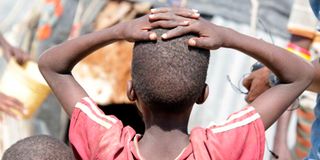Fish bone soup, papyrus reeds a delicacy for starving children

Children in Watalii village in Marsabit County on April 2, 2022.
They survive on fish bones and the raw roots of papyrus reeds.
You may not fancy this meal, but to the children of Bubua and Arrie villages on the shores of Lake Turkana, this is their lifeline amid the devastating drought and famine that have ravaged northern Kenya.
The dry spell has already claimed 12 children in the Illeret area of Marsabit County with local community health volunteers saying the number could be higher.
“It’s not just starvation. Children are also affected by other conditions, which are worsened by malnutrition,” says Mr Stephen Kute, a community health volunteer.
Children as young as five wake up early every morning and head to the local fish market on the Ethiopian side of the border in search of food. Here, they will wait for fishermen to deliver their catch.
For the better part of the day, the children will fillet the fish and carefully stack the bones on one corner of the chopping board. They keep an eye on eagles that hover above them, waiting for an opportunity to pounce on the scraps. The slightest distraction could easily mean that a family will go to bed hungry. Once they are done filleting, the bones will be their pay for the day’s work. Monetary payment would not do them any good anyway as it would be too little to buy food, which is scarce.
“It is a service in exchange for food. It is not much but to them it is better than starving,” says Mr Peter Alkol, a resident.
Fish bones
At Arrie market, we meet Ms Nanam Jachuomor carrying a stack of fish bones. Today is her lucky day and her son’s hard work has earned their family of 10 a meal after three days of hunger. A group of excited children follows her back to their manyatta. The preparation process is pretty straightforward. The bones are boiled for about 20 minutes, then the soup is served. Across the village at Bubua, Ms Forote Nyangaa and her four children are not so lucky today as they did not get any fish bones.
Desperate times call for desperate measures and this family is desperate. Today they will eat the roots of papyrus reeds growing on the shores of Lake Turkana. They take the lead as we wade through the murky waters, rummaging for the roots. The children are experts in picking out the thickest roots.
Sometimes, the reeds are too deep in the mud and are hard to pull out. But the children must eat and so they pull up the roots right at the source. A few bites later, the children are satisfied and return home to wait for the next meal, if it is to come.
“Children are hungry and that means they will eat anything just to fill their stomachs. This has grave effects and most of them become very sick,” says Mr Kute. Children and the elderly in 1,200 households are starving.
Hunger
The devastating effects of hunger are clear on the children who are visibly malnourished. Their frail bodies are wasting away with each passing day.
Mr Kute says the biggest health issue the region has been dealing with is malnutrition, which begins with wasting.
Wasting is defined as low weight-for-height. It often indicates severe weight loss.
Prolonged malnutrition alters cellular metabolism, leads to impaired function, and finally, loss of body tissues.
Clinically, malnutrition is often associated with muscle dysfunction and weakness and altered immunity in an increased risk of infections.
Health and physical consequences of prolonged states of malnourishment among children are delay in the physical growth, motor development; lowered intelligence quotient (IQ), greater behavioural problems and deficient social skills, and susceptibility to contracting diseases.
Due to the burden of malnutrition in Ileret, most of the under-fives bear the scars of oedematous malnutrition (kwashiorkor) due to the extremely lower household dietary diversity score.
Last month, authorities reported the death of 12 children due to starvation and now the locals are accusing the government of neglecting them.
“The situation here is unfortunate and unacceptable. No child should starve to death but we have let our children down. It is time to act or we will lose all these people,” says Mr Alkol.






